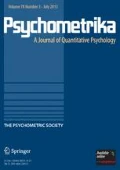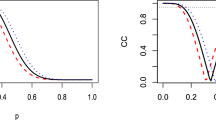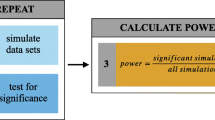Abstract
Non-spurious methods are needed for estimating the coefficient of equivalence for speeded tests from single-trial data. Spuriousness in a split-half estimate depends on three conditions; the split-half method may be used if any of these is demonstrated to be absent. A lower-bounds formula,r c, is developed. An empirical trial of this coefficient and other bounds proposed by Gulliksen demonstrates that, for moderately speeded tests, the coefficient of equivalence can be determined approximately from single-trial data. It is proposed that the degree to which tests are speeded be investigated explicitly, and an indexτ is advanced to define this concept.
Similar content being viewed by others
References
Adkins, D. C. Construction and analysis of achievement tests. Washington, D. C.: U. S. Government Printing Office, 1947.
Baxter, B. An experimental analysis of the contribution of speed and level in an intelligence test.J. educ. Psychol., 1941,32, 285–296.
Buros, O. K. (Ed.) The third mental measurements yearbook. New Brunswick: Rutgers University Press, 1949.
Conrad, H. Information which should be provided by test publishers and testing agencies on the validity and use of their tests. Proceedings, 1949 Invitational Conference on Testing Problems, pp. 63–68. Princeton: Educational Testing Service, 1950.
Cronbach, L. J. Coefficient “alpha” and the internal structure of tests. To be published.
Cronbach, L. J. Essentials of psychological testing. New York: Harper and Brothers, 1949.
Cronbach, L. J. Test “reliability”: its meaning and determination.Psychometrika, 1947,12, 1–16.
Davidson, W. M., and Carroll, J. B. Speed and level components in time-limit scores, a factor analysis.Educ. psychol. Meas., 1945,5, 411–427.
Guilford, J. P. Fundamental statistics in psychology and education. New York: McGraw-Hill Book Co., 1950.
Gulliksen, H. The reliability of speeded tests.Psychometrika, 1950,15, 259–269.
Guttman, L. A basis for analyzing test-retest reliability.Psychometrika, 1945,10, 255–282.
Iowa Silent Reading Test, Manual. Yonkers: World Book Co., 1943.
Paterson, D. G., and Tinker, M. A. Time-limitvs. work-limit methods.Amer. J. Psychol., 1930,42, 101–104.
Tate, M. W. Individual differences in speed of response in mental test materials of varying degrees of difficulty.Educ. psychol. Meas., 1948,8, 353–374.
Thurstone, T. G., and Thurstone, L. L. Mechanical aptitude III: Description of group tests. Psychometric Laboratory Reports, No. 55, 1949.
Thorndike, R. L. Personnel selection. New York: John Wiley and Sons, Inc., 1949.
Author information
Authors and Affiliations
Rights and permissions
About this article
Cite this article
Cronbach, L.J., Warrington, W.G. Time-limit tests: Estimating their reliability and degree of speeding. Psychometrika 16, 167–188 (1951). https://doi.org/10.1007/BF02289113
Received:
Revised:
Issue Date:
DOI: https://doi.org/10.1007/BF02289113




